Aug 2017 2nd Edition
Aug 2017 2nd Edition Estelle Greeff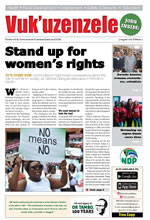
Translations
Stand up for women’s rights
Stand up for women’s rights JoyWomen's Month
It’s time for communities to hold honest conversations about the role of women in society, as National Dialogues take place in Women’s Month.
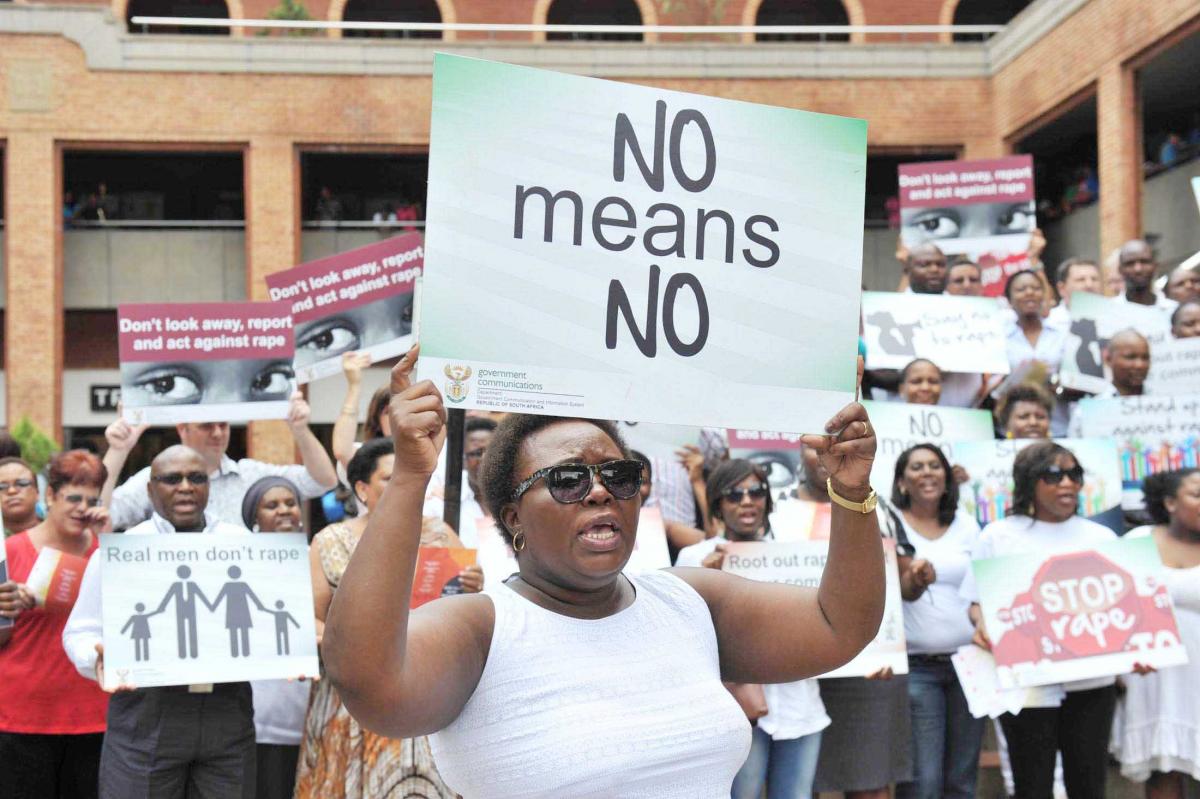 With Women’s Month underway, a series of National Dialogues is taking place across the Northern Cape to raise awareness of, and find ways to tackle, the scourge of gender-based violence.
With Women’s Month underway, a series of National Dialogues is taking place across the Northern Cape to raise awareness of, and find ways to tackle, the scourge of gender-based violence.
Minister in the Presidency Responsible for Women, Susan Shabangu, said her department will be working with men and women to bring an end to the violence women suffer.
Speaking at the launch of the 2017 Women’s Month programme in Pretoria recently, the Minister said it is time communities had honest conversations about the roles that women play in society.
“The dialogues are also going to scrutinise the effects of how families reserve the biggest piece of meat for men. Our churches are led by men, the majority of schoolbooks are written by men, and the media is dominated by men. These realities contribute to how men are positioned as more important than women in society.”
We need women to take the lead
In Limpopo, MEC for Coopertive Governance, Human Settlements and Traditional Affairs, Makoma Makhurupetje, shared the same message as she launched the province’s month-long Women’s Month activities. Speaking at the Leboeng Sports Ground, the MEC reminded the audience that today’s freedom is the result of brave men and women who chose to stand up against tyranny.
While National Women’s Month is a time of reflection and tribute to the women who marched to the Union Buildings in 1956, and to the many women-led campaigns of the past, it is also a time to assess the present and plan for the future.
Not standing up for the rights of women today is a betrayal of the legacies of women like Dora Tamana, Albertina Sisulu, Lillian Ngoyi, Helen Joseph and Charlotte Maxeke. “All these women refused to accept the false assertions that their place was merely limited to the kitchen,” MEC Makhurupetje said.
There are women who the country should look to for inspiration, she added. These role models are making waves everywhere in society. But the country needs more women in leadership roles, especially in the corporate world and technical professions.
“Corporate South Africa is one sector that is still male-dominated and must be changed sooner rather than later. My department is already taking a lead in this regard – as we have taken a deliberate decision to appoint 30 per cent women and 20 per cent youth contractors to deliver on our housing mandate.”
Working together
The theme for this year’s Women’s Month is “The Year of OR Tambo: Women united in moving South Africa forward”.
The department’s dialogue roadshow taps into this idea, championed by OR Tambo. Speaking at the Women’s Conference in Luanda in 1981, he reminded his audience: “The mobilisation of women is the task, not only of women alone, or of men alone, but of all of us, men and women alike, comrades in struggle.”
The Minister believes that open dialogues are the way to change society’s perceptions of the role of women. She challenged faith-based organisations, traditional leaders, community leaders, women’s organisations, and even stokvels to stand up and let their voices be heard.
It is only when communities stand togethr that real change takes place she said. “We believe that forging partnerships with communities, business, faith-based organisations and traditional leadership will give women a first-hand opportunity to directly influence government programmes and ensure the mainstreaming of gender issues through the national dialogues programme.”
The department is taking the lead to create opportunities for women to join the economy as equals. “Women are key beneficiaries in the development of skills. The department is also hard at work developing sanitary dignity, gender-responsive budgeting and women financial inclusion frameworks to further the women socio-economic agenda in the country.”
Strawberry growing success for KwaZulu-Natal farmers
Strawberry growing success for KwaZulu-Natal farmers JoyYoliswa and Xolani Gumede, a young couple from KwaZulu-Natal, have made history as the first black strawberry farm owners in the province. They own Cappeny Estates.
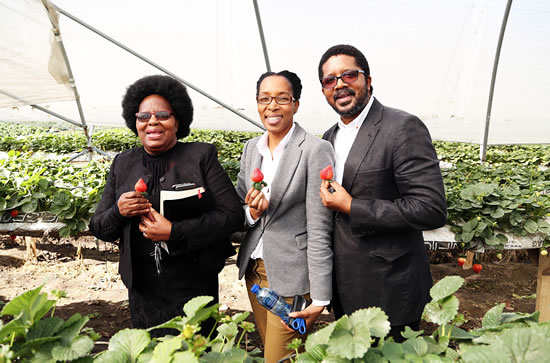 Whilst strawberries generally grow best in a low temperature climate, Cappeny Estates, located in Ballito north of Durban, is growing the fruit in the hot and humid area.
Whilst strawberries generally grow best in a low temperature climate, Cappeny Estates, located in Ballito north of Durban, is growing the fruit in the hot and humid area.
Yoliswa (43) is a former marketing and public relations professional, whilst Xolani (45) used to be a project manager. When they started the farm in 2013 they were not sure that their plan would work.
“There is always a fear of failure, but as they say courage is not the absence of fear but going ahead despite the possibility of failure. We did our research and found that there are various varieties of strawberries that are more heat tolerant than others. These varieties didn’t exist 20 to 30 years ago,” Xolani said.
Cappeny Estates is the first commercial project of its kind in KwaZulu-Natal, and the farm produces between 1 000 and 2 000 punnets of strawberries a day. It has created 23 permanent employment opportunities and offers employment to between 30 and 100 seasonal workers.
The farm grows five varieties of strawberries and initially had four hectares of land under production. It has now expanded to 8.5 hectors, with plans to increase its harvest. Cappeny Estates sells its produce to various national supermarkets, such as Checkers Hyper, Spar, Food Lover’s Market and Woolworths and is about to start exporting its goods to the Middle East.
Xolani said they were looking for a crop that would do well locally and in the export market. Cappeny Estates is located close to the airport, which makes exporting produce easier and ensures cheaper transport costs.
Xolani said there are numerous challenges growing strawberries, but lessons have been learnt and problems can be avoided.
“There are severe production challenges. Ensuring profitability meant a lot of research and some failed attempts, before we got it right. If they were easy to grow and sell, everybody would be doing it. The fact that not many people are doing it, tells you that at some stage there’s a high element of risk. The business has to pay royalties − in foreign currency − to an American company for the intellectual property which generated the cultivars and for the rights to grow the strawberries,” Xolani said.
Xolani offered to share their knowledge with newcomers, and is not concerned that they could be helping future rivals enter the industry. “We cannot cope with the demand, so there is plenty of business for everyone,” he said.
One of the workers at Cappeny Estates Mbali Biyela (37) said she enjoys her work because it helps her to provide for her family. “Xolani and his wife are humble and understanding people, who care for the wellbeing of their workers. If we are here we do not feel that we are at work. This place is more like home,” she said.
Deputy Minister of Agriculture, Forestry and Fisheries Bheki Cele and the MEC of Agriculture and Rural Development, Themba Mthembu, visited the farm recently to showcase the young farmers’ work in line with the National Youth Policy 2020 and the department’s Young Producers and Entrepreneurs Strategy.
Cele said the farm has met government’s standards of maintaining food security and nutrition, job creation and contributing towards the country's Gross Domestic Product (GDP). He added that government will be working closely with the farm owners so that such productive farms can be multiplied and the youth can venture in such opportunities.
“The farm offers food security and nutrition and job creation and contributes to the GDP. The department is mandated to grow agriculture’s contribution to the GDP, from 2.7 per cent to 6 per cent.”
Women’s emancipation is everyone’s business
Women’s emancipation is everyone’s business JoyWomen's Month

Women’s Month celebrates women’s achievements in pursuit of gender equality in all aspects of life in South Africa. It is also a time to reflect on the work that still needs to be done to achieve gender equality and genuine freedom from poverty and abuse in a modern democratic society.
President Oliver Reginald Tambo, a renowned son of our soil, was a leader who believed strongly in gender equality and women’s emancipation. He was also a selfless patriot who lived and strived for the liberation of our country and its people. In his honour, we declared the year 2017 the Year of Oliver Reginald Tambo.
The National Women’s Day on 9 August pays tribute to women and their role in the liberation struggle. This year it takes place at the same time as the centenary of Oliver Tambo’s year of birth, under the theme “The Year of OR Tambo: Women United in Moving South Africa Forward”.
The year 2017 marks the 61st anniversary of the Women’s March to the Union Buildings in Pretoria on 9 August 1956. On that day up to 20 000 women of all races, class and religious persuasions protested against the extension of Pass Laws. The march was a turning point in the role of women in the struggle for freedom and our society at large.
Unite to prevent abuse
We began this year with an alarming increase in the levels of attacks and killings of women and children, as well as human trafficking, in some parts of the country. We must unite to prevent such violence against women, support survivors of abuse and bring perpetrators to justice.
It’s our responsibility to prevent abuse and ensure a safer society for women and children. It is only through our collective efforts that we can create greater awareness, and reduce the number of sexual offences as well as attacks on women and children.
As reported in Vuk’uzenzele this month, the National Dialogues on Violence against Women and Children will also help to combat the continued scourge of violent attacks on, and abuse of, women.
These dialogues are a platform for deepening democracy whilst ensuring safer and crime-free communities especially for women and children.
The Report on Status of Women in the South African Economy indicates that in the area of poverty and inequality, women remain poorer and more women than men tend to live below the poverty line.
Access to economic opportunities
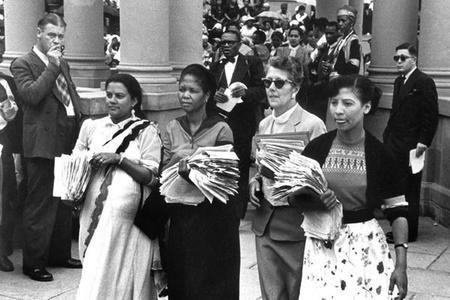 The South African economy has moved into technical recession and, invariably, women will be most affected by the economic decline and will bear the brunt of its resultant negative economic and social effects.
The South African economy has moved into technical recession and, invariably, women will be most affected by the economic decline and will bear the brunt of its resultant negative economic and social effects.
As government, we will continue to focus on the empowerment of women in all government programmes and prioritise women’s access to economic opportunities and, in particular, to business financing and credit.
Through government policies, we are ensuring the full participation of women in the economy and driving an inclusive economy. We have introduced the Gender Equality Bill to accelerate the empowerment of women and attain 50/50 gender parity for the country.
The National Development Plan also identifies the financial inclusion of women as a critical tool that will result in quicker poverty elimination, reduce inequality and contribute towards the achievement of the 2030 target.
Breaking gender barriers
The advancement of women’s emancipation is everyone’s business and needs the support of government, business, labour and civil society. We must continue to work together to remove the barriers, which prevent women from entering and thriving in the labour market.
We also pride ourselves on, and celebrate, women achievers and the empowerment of women, some of whom have taken their rightful place in Parliament, government and civil society at large.
Over the last 23 years of democracy, we ensured that women enjoy the same rights as their male counterparts in education, business, employment, property, inheritance and justice. They broke gender barriers and entered previously male-dominated sectors such as mining, construction and infrastructure development.
Today, we have more women serving as judges and magistrates and in senior management positions in the public service.
While South Africa has made great strides to advance women in our country, we believe that more needs to be done to overcome the triple challenges of unemployment, poverty and inequality.
During this Women’s Month, therefore, we urge women to continue playing a central role in building our economy and a strong nation. It is critical that we continue to advocate for women’s empowerment and raise awareness in order to change gender-based norms and practices that continue to keep many women confined to the margins of our society and economy. It is what OR Tambo would have continued to advocate for, had he still lived.
Awards honour women researchers, scientists
Awards honour women researchers, scientists JoyWoman's Month
By celebrating women role models, the Department of Science and Technology hopes to inspire budding scientists, especially young girls, to choose the sciences as a career path.
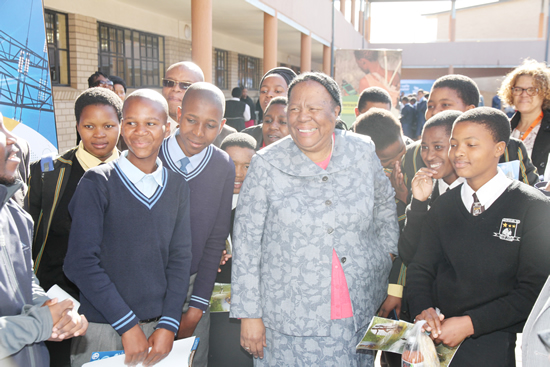 The Department of Science and Technology’s annual Women in Science Awards takes place in August. This year’s theme is Women’s Economic Empowerment in the Changing World of Work.
The Department of Science and Technology’s annual Women in Science Awards takes place in August. This year’s theme is Women’s Economic Empowerment in the Changing World of Work.
Since 2003 the awards have honoured the achievements of South African women scientists and researchers.
Minister Naledi Pandor – who recently received an honorary doctorate from NOVA University in Lisbon – understands the importance of role models. Her mother Fikile Matthews was one of the first African women to attend Fort Hare University to read science.
Innovation is a catalyst
Speaking at the Science Olympiad Awards early in July, the Minister spoke of the importance of science and technology.
Innovation alone, she reminded the young scientists, is not the answer, but it is a catalyst.
It fell to young people like the scientists being honoured, she said, to use their talents to find new ways to do things. “There are many exciting puzzles that young minds such as your own could play a role in resolving. For example, what should be done to encourage millions of young people to love and succeed in mathematics? You could help us find a solution to this.”
The Women in Science Awards are just one way the department is encouraging more women to choose a career in science. Fifty-five per cent of the department’s bursary funds and National Research Foundation funding has been set aside for women.
At the awards ceremony in 2014 the minister explained that women researchers and students were often side-lined because they found it difficult to access funds. “I want to make it easier for women to access funding, because I believe female scientists and researchers have much to contribute to our future.”
Award categories
1. Awards for Distinguished Woman Researchers
2. Awards for Distinguished Young Woman Researchers
3. Awards for Research and Innovation
4. DST Fellowships
- Four current master's students: Two in natural and engineering sciences, one in human and social sciences (HSS), and one in indigenous knowledge systems (IKS).
- Four current doctoral students: two in natural sciences, one in HSS, and one in IKS.
5. TATA Africa Scholarships for Women in Science, Engineering and Technology
- Three master's students in disciplines where the participation of women is low.
- Three doctoral students in disciplines where the participation of women is low.
Past Women in Science Award winners
Past Women in Science Award winners JoyWomen's Month
The Women in Science Awards aim to inspire other women (and men) to scientific curiosity and research excellence.
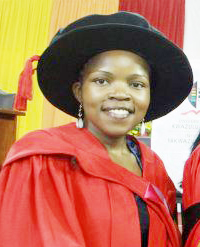 As Minister of Science and Technology Naledi Pandor pointed out at the 2016 Women in Science Awards: “The awards are a celebration of the achievements of women in science and a reminder that we will not realise the full scientific potential of our country until all our young scientists are able to enjoy access to the best facilities in education.”
As Minister of Science and Technology Naledi Pandor pointed out at the 2016 Women in Science Awards: “The awards are a celebration of the achievements of women in science and a reminder that we will not realise the full scientific potential of our country until all our young scientists are able to enjoy access to the best facilities in education.”
Through the awards, the Department of Science and Technology creates role-models for young women to look up to and follow into a career in sciences.
Meet four women who have been honoured.
2014 winner Distinguished Woman Scientist (Natural Sciences and Engineering) Award: Professor Priscilla Baker.
Professor Baker teaches chemistry at the University of the Western Cape and is co-leader of the electrochemistry research group, SensorLab. She has published in international journals and co-authored books but, as she pointed out after winning her award, the favourite part of her career is teaching.
“Developing human potential - seeing students grow from not believing they can do it to seriously achieving, seeing them master new skills and endure the discipline of post-graduate training, that's what really gets me excited. Every year of teaching is different, and so is every student.”
2016 runner up Distinguished Young Women Researchers category for humanities and social sciences: Professor Marianne Matthee.
Professor Matthee is recognised for her work to improve the International Trade Programme curriculum at North West University. Thanks, in part to her work, the number of students choosing to study international trade relations and international trade finance has grown.
“My research focus includes firm-level exports and I was also recently the only female team leader in the initial round of research projects investigating new data from firms by the United Nations University, along with the National Treasury and South African Revenue Service.”
2013 2nd runner up Distinguished Young Women in Life Sciences: Dr Christina Thobakgale.
Raised by a single mother in rural Ga-Mashashane, Limpopo, Dr Thobakgale was the first of eight children to study at a tertiary institution. She was honoured for her research in HIV-infection and the cellular and viral factors that influence how the disease progresses.
Thobakgale is involved in helping to develop the next generation of scientists and has supervised and mentored laboratory technicians and post-graduate students. At the 6th South African Aids Conference in 2013, she chaired the Basic Sciences Track meeting.
Women in Science: 2012 DST Fellowships Sindisiwe Nondaba.
When she received the Fellowship in 2012, Nondaba was a University of Pretoria MSc student studying biotechnology and specialising in biochemistry.
As a first-year postgraduate student, recognition came early, but she had gone a long way to achieving the objectives of her study. Using multidisciplinary collaborations, she wanted to create a data set that could be more easily reproduced.
At the 2012 awards she said she intended to go on to pursue a doctorate in biotechnology and “become one of the top female scientists in this country”.
Funding for small business development
Funding for small business development JoyIn a bid to grow entrepreneurship in South Africa, a number of government funding platforms are available to qualifying enterprises and individuals.
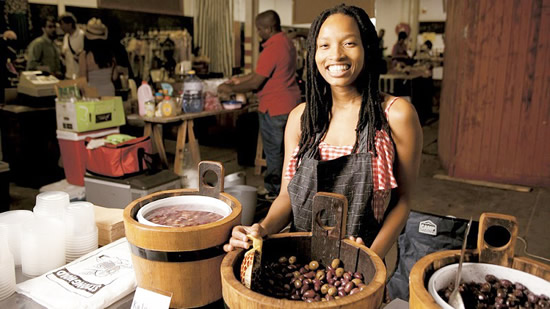 Between June 2015 and May 2016, the Department of Small Business Development (DSBD) trained 1 037 informal traders, established 29 satellite offices and five centres of business excellence.
Between June 2015 and May 2016, the Department of Small Business Development (DSBD) trained 1 037 informal traders, established 29 satellite offices and five centres of business excellence.
The department’s mandate is the promotion and development of sustainable and competitive entrepreneurs, small businesses and co-operatives that contribute to job creation and economic growth.
As long as your business or co-operative meets the criteria, you can access funding or grants through the DSBD or one of its agencies. Bear in mind, public sector funding involves a thorough and careful process, so be patient and plan for longer timelines.
SEFA
Established in 2012, the Small Enterprise Finance Agency (SEFA) helps start-ups and small businesses. They will either fund grants or loans or help entrepreneurs access funding from other sources. SEFA services are designed to help micro, small and medium-sized business enterprises. Co-operatives and survivalist enterprises that need help to grow are especially encouraged to seek assistance.
Loans from SEFA can range from as little as R500 up to R3 million, with the loans paid directly to owners. This direct payment is important in a business sector that is often not part of the traditional banking system.
Micro, small and medium enterprises and co-operatives with a viable business plan can apply for a loan. SEFA staff will evaluate the application to determine the viability of the loan, and at what rate it can be repaid without damaging the company.
E-mail: helpline@sefa.org.za
Call centre: 086 000 7332
Website: http://www.sefa.org.za/
NEF
If you are directly involved in your business and need funding between R250 000 and R75 million, the National Empowerment Fund (NEF) may be able to help. It is mandated to offer financial and non-financial assistance to black-owned businesses.
Funding decisions are guided by the Industrial Policy Action Plan across a variety of sectors. Start-ups can qualify for funding up to R10 million. The NEF also offers assistance for rural and community development, franchise finance and new industry development.
E-mail: info@nefcorp.co.za
Call centre: 0861 843 633
Website: www.nefcorp.co.za / www.nefbusinessplanner.co.za
SEDA
The Small Enterprise Development Agency – an initiative of the Department of Trade and Industry – is available to give guidelines and training to entrepreneurs and assist with the processes needed to access funds, such as the drawing up of business plans.
E-mail: info@seda.org.za
Call centre: 0860 103 703
Website: www.seda.org.za
How to access services
Eligibility for assistance is based on:
- A completed application form and business plan by owner or manager
- Ability to repay loan
- Business must be registered
- The business must operate in South Africa
- Assessment of application will be done at a regional office closest to the business.
After due diligence is done, a committee decides on approval.
Upon approval, before funds are transferred, applicants will be required to sign a contract acknowledging debt.
NSFAS opens applications for 2018
NSFAS opens applications for 2018 LondekileThe National Student Financial Aid Scheme has joined forces with the National Youth Development Agency to make it easier for people to apply for tertiary education funding.
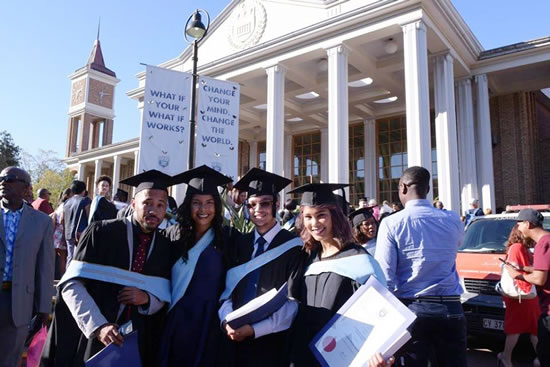 Prospective students who qualify for student funding can now apply to the National Student Financial Aid Scheme (NSFAS) for the 2018 academic year.
Prospective students who qualify for student funding can now apply to the National Student Financial Aid Scheme (NSFAS) for the 2018 academic year.
The application process opened on 1 August and closes on 30 November 2017.
NSFAS, formerly known as Tertiary Education Fund of South Africa, has awarded about R72 billion in loans and bursaries to deserving students since its inception.
In the current academic year alone, at least 524 950 students have received funding, with half of that number from 50 technical and vocational education and training colleges and the other half from 26 public universities.
In an effort to create an easier application process for students, NSFAS has partnered with the National Youth Development Agency (NYDA), which will assist with applications.
Making access easier
The partnership will allow NSFAS to make use of the 15 NYDA branches nationwide, as well as the more than 50 Local Youth Offices to accept NSFAS applications, according to NSFAS acting executive officer Lerato Nage.
Local Youth Offices are situated within local government facilities in all nine provinces.
Nage emphasised that the NSFAS office has been working hard to enable students easier access to applications.
“We have worked behind the scenes to strengthen and improve our internal systems and capacity, to be able to deal with the high volumes of applications that we are expecting.
“We anticipate that we will receive an even greater number of applications this year, for the 2018 academic cycle,” Nage added.
Grade 12 learners, out-of-school young people, unemployed young people and public university and TVET college students currently not funded by NSFAS who are in need of financial support in 2018 can start submitting their applications.
What to do
Students can log onto the NSFAS website (www.nsfas.org.za) to start their application process. Alternatively, students may visit any NYDA branch or Local Youth Office in their region, where they will receive assistance to complete and submit a manual application.
Native Nosi honey creates a buzz
Native Nosi honey creates a buzz JoyNative Nosi is a local honey brand. The 100 per cent black-owned company sells raw honey harvested from its own bee hives as well as those owned by small farmers.
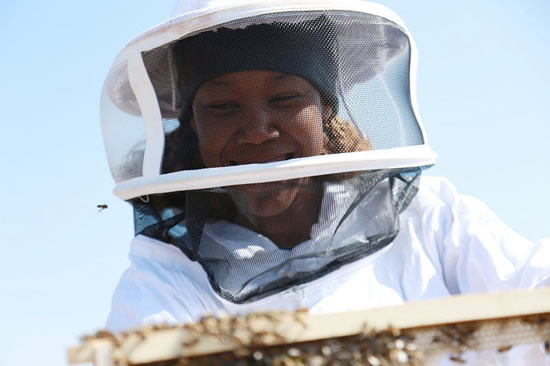 “I can tell you exactly where the honey in every bottle comes from. With many honeys, you can’t really tell the origin of the honey and irradiation often removes all the good enzymes from the final product,” said owner Mokgadi Mabela.
“I can tell you exactly where the honey in every bottle comes from. With many honeys, you can’t really tell the origin of the honey and irradiation often removes all the good enzymes from the final product,” said owner Mokgadi Mabela.
Mabela's enthusiasm is evident in every word that tumbles from her mouth. Native Nosi sells about 200kg of honey every month but Mabela is working on scaling that up to at least a 1 000kg because she often cannot meet demand.
She started by buying honey from her father, Peter Mabela, a beekeeper, and selling that to friends and colleagues.
As demand grew, he tapped his network of farmers. “Eventually, I started buying my own beehives and would set them up where my father had his. I always seem to be chasing quantity. People like my honey because it’s authentic. They want to know where their food comes from and how their food is produced and I can tell them that.”
She tops up her supply by buying raw honey from small farmers in rural communities in Limpopo, Gauteng and Mpumalanga. These emerging farmers are often exploited because they do not have access to markets, she says. “They are all subsistence farmers who use bees to pollinate their crops. Honey is a by-product. They don’t have access to a market for their honey so they sell it cheap. I am trying to change that by giving them a market and a fair price.”
The story of an African company
Mabela is the third generation of her family to work with bees. Her grandfather was the first. “He was a teacher, but he always wanted to be a farmer. But his father was adamant that he was going to be a teacher.”
After returning from the Second World War, her grandfather used his savings to buy land and began farming. He kept livestock and planted seasonal crops. “He had a few beehives because he understood the role they played in pollinating his crops.”
Her father followed his father into agriculture, this time concentrating on beekeeping. Mabela never felt that she would follow in his footsteps. After high school, she left home to study political science and international relations at the University of Pretoria.
About six years ago, her father got very ill and for the first time, Mabela seriously considered following her father’s path. “My father was ill, and my mother called me.
She said no-one had any idea where his beehives were or what was going on with his business. That’s when I seriously began thinking about the honey business.”
Today, the proudly South African beekeeper is as busy as the insects she is so passionate about as she does her bit to decrease the country’s reliance on imported honey.
Training programme serves up new batch of chefs
Training programme serves up new batch of chefs LondekileThe lives of 305 youngsters have been spiced up! These kitchen whizzes recently graduated from the Department of Tourism’s National Youth Chefs Training Programme (NYCTP).
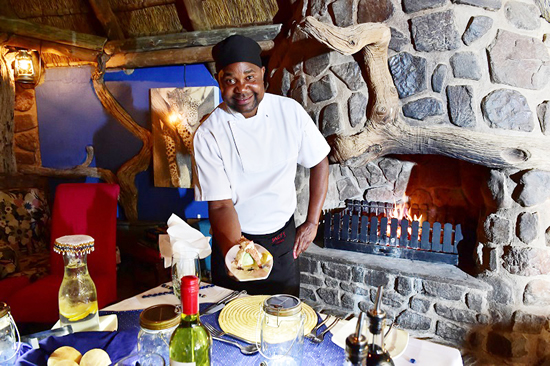 Funded through the Expanded Public Works Programme (EPWP), the initiative drew aspiring chefs from across the country.
Funded through the Expanded Public Works Programme (EPWP), the initiative drew aspiring chefs from across the country.
Speaking at the graduation in Soweto, Tourism Minister Tokozile Xasa reminded them that this was just the first step. “Celebrate your achievement today and prepare to make a meaningful contribution to our exciting sector.”
Launched in 2011, the NYCTP is run by the South African Chefs Association (SACA) and consists of theory and practical in-service training. On graduation, the new chefs receive an internationally-recognised Professional Food Preparation and Pastry certificate.
World-class chefs
Stephen Billingham, SACA president, said that graduates could walk into a career anywhere in the world. “The selection process for the training programme is a rigorous one, and we are confident that we are releasing competent world-class chefs into the industry.”
For their in-service training, students were placed in kitchens as diverse as the Estate Private Hotel, aboard a P&O cruise ship and at the high-pressured Emperors Palace.
These partnerships, the Minister said, ensured that graduates are able to gain the work experience necessary to be employed. “Our partnership with industry stakeholders has played a critical role in the success of this training programme. It is only through such partnerships that we can grow tourism, empower our communities and eradicate poverty.”
In 2013, a third year was added to the course, which sees students working towards an Advanced Diploma in Food Preparation and Cooking. The extra year sees them learning leadership and management skills, menu development and specialised cooking skills.
The programme is ongoing, so any youngsters with a desire to make a career in the food industry can email apply@saca.co.za or fax 086 756 6764 or post to PO Box 291305, Melville 2109.
Applicants must:
- Be between the ages of 18 and 35
- Have a matric and matric-level English
- Be a South African citizen
- Have been unemployed for at least 12 months.
Previously disadvantaged youth qualify as medical doctors
Previously disadvantaged youth qualify as medical doctors LondekileYoung South Africans studying medicine in Cuba will make a difference to the country’s primary healthcare system.
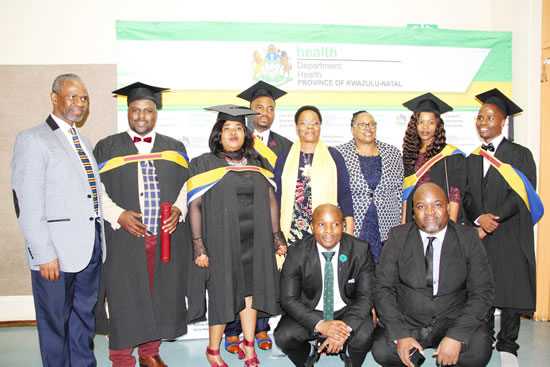 Tears flowed from Mdumiseni Mkhize’s eyes, a former painter from Port Shepstone on KwaZulu-Natal’s South Coast, when he graduated as medical doctor after six years of study in Cuba.
Tears flowed from Mdumiseni Mkhize’s eyes, a former painter from Port Shepstone on KwaZulu-Natal’s South Coast, when he graduated as medical doctor after six years of study in Cuba.
Mkhize (28) is one of 70 young doctors from poverty stricken communities whose lives have changed after training and qualifying as medical doctors at the Nelson Mandela Fidel Castro Medical Training programme in Cuba. The graduation ceremony was recently held at the University of KwaZulu-Natal.
The programme seeks to address the shortage of doctors in the country. Since its inception in 1998, 590 doctors have qualified and are working in rural communities.
Mkhize said he hoped his graduation will inspire other students who do not have money to not lose hope.
“When I finished matric in 2009, I had no money to further my studies. I got a job as a painter and worked for almost a year. When I heard about the opportunity I applied. My trip to Cuba was my first trip away from home and I had to study subjects in a foreign language. I knew I could complain and come back home, but knowing where I come from and where I wanted to be made me persevere,” he said.
“As medical practitioners, we have the responsibility to go out there and teach primary healthcare to our community. Simple things, like hand washing,” he said.
KwaZulu-Natal MEC for Health Dr Sibongiseni Dhlomo described the students as pioneers of government’s efforts to re-engineer primary healthcare. There are 2 885 South African medical students in Cuba, at various levels of study. Over 590 doctors have qualified and 98 are in their final year.
South African medical students who study in Cuba spend a year learning Spanish, five years doing academic medical studies, and 18 months being integrated into the South African medical health system. They also undergo a one-year internship.
Deputy Minister of Health Dr Joe Phaahla said the programme is achieving a number of critical objectives in supporting the transformation of health in South Africa. “It strengthens government’s ability to ensure a better life for all by increasing the number of qualified doctors and improving access to healthcare in support of our National Health Insurance system.”
Becoming an organ donor saves lives
Becoming an organ donor saves lives LondekileAugust is National Organ Donor Month and the perfect time to sign up to become an organ donor.
While around 4 300 South Africans are waiting for organ and cornea transplants, less than 0.2 per cent of South Africans are registered organ donors.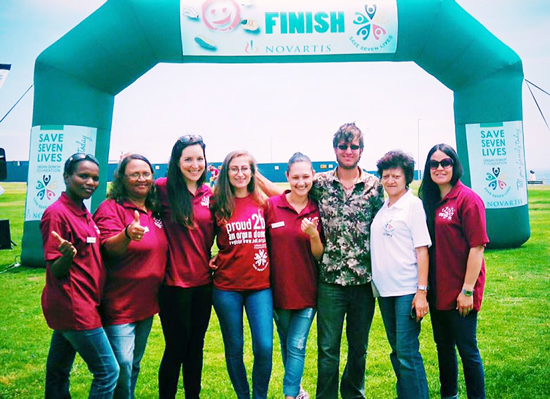
Did you know that by signing up to become an organ donor, you could save up to seven lives and help alleviate the dire shortage of available organs?
How organ donation works in South Africa
While a person may decide to donate a kidney to a loved one, and go on to live a long and healthy life with just one kidney, most transplants in South Africa are conducted using the organs of deceased donors who had signed up to the national organ donor registry.
This is done via the Organ Donation Foundation of South Africa. Donors are given a donor card and a sticker for their identity document and driver’s licence to identify them as a potential donor.
Once an organ becomes available for transplant, all suitable recipients that match the donor’s blood group will be cross-matched against the donor. In addition to time on the waiting list, other factors such as age, previous transplants and current health are taken into consideration when allocating the organ.
The donor’s family will then be required to give consent for the organs to be harvested. It is therefore important for donors to inform family and friends of their decision to become a donor.
What you need to know about organ donation
How do you register to become an organ donor?
You can register online at www.odf.org.za or call the Organ Donor Foundation’s toll free line on 0800 22 66 11.
Who can sign up as a donor?
Anyone who is in good health and clear of any conditions that may affect the recipient.
Do I need medical tests to register as a donor?
Medical tests are only carried out at the time of death.
Are there any costs involved in becoming a donor?
Signing up to become a donor will not cost you or your family anything and is completely free. The hospital covers all medical expenses once your family gives consent for the donation.
Can I change my mind about being a donor?
Donors can change their mind at any time.
What organs can be donated?
Your heart, liver and pancreas can save up to three lives, while your kidneys and lungs can help up to four people. You can also opt to donate only certain organs. Here you must inform your family which organs you do not want to donate.
How soon after death will the organs be removed?
It is critical that your organs are removed as soon as possible after brain death has been declared in order to ensure every possible chance of a successful transplant. By law two independent doctors will need to certify brain death.
(Source: The Government Employees Medical Scheme)
Coega boosts SMMEs
Coega boosts SMMEs LondekileOver the past year, the Coega Development Corporation has awarded R30 million in contracts to small businesses in the Nelson Mandela Bay metro.
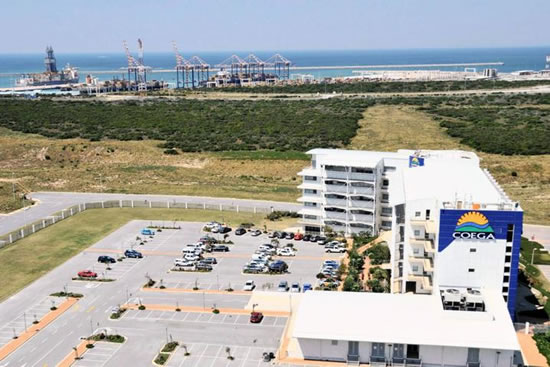 The Coega Development Corporation (CDC) recently invested millions into Eastern Cape-based small, medium and micro enterprises (SMMEs) to complete various construction projects in the Coega Special Economic Zone.
The Coega Development Corporation (CDC) recently invested millions into Eastern Cape-based small, medium and micro enterprises (SMMEs) to complete various construction projects in the Coega Special Economic Zone.
According to the CDC’s head of marketing and communication, Dr Ayanda Vilakazi, the corporation has awarded R30 million in contracts over the past 12 months to SMMEs from the Nelson Mandela Bay metro area.
The contracts include brickwork, electrical, structural steel, civil works and landscaping.
The construction of South Africa’s first factory to manufacture liquid petroleum gas cylinders for MM Engineering is underway, with contracts worth R22 246 847 allocated to SMMEs.
“When it is running at full capacity MM Engineering will be producing 3 200 metal gas cylinders a day. This is one of the first plants of its type in Africa. It will serve the local market, as well countries within the Southern African Development Community and international markets,” Vilakazi said.
Work on the factory started in May 2017 and is due to be completed by February 2018. SMMEs contracted to the project include Ascon Civil Engineering and YKW Projects, and they represent a portion of the 39 per cent of SMME participation achieved.
Owner of steel construction company YKW Projects Shaheed Nordien said the project his business got from the CDC will boost its profile.
“Getting these contracts means growth for my business. Currently we’ve got about 12 permanent employees and up to 50 contract workers,” said Nordien, who started his business nine years ago.
CCA Fencing was awarded a contract to replace fencing in the Coega Special Economic Zone (SEZ), which entails the removal of 11 kilometres of existing palisade fencing and its replacement with a more secure and durable system.
The project is due to be completed in August 2017.
More than R2 million of the project’s costs has been awarded to SMMEs Magma Civil Engineering Contractors, Construction Solutions and Ngingi Construction. The project has 36 per cent SMME participation.
“As an empowerment-driven organisation, the CDC is conscious of the important role that the small business sector plays in unlocking economic growth in Nelson Mandela Bay and South Africa.
Our dedicated SMME unit was specifically established in line with our vision to be a catalyst for championing socio-economic development,” said Vilakazi.
The third project is the building of the CDC’s Custom Control Area administration block in Zone 1 in the Coega SEZ. The contract value to SMMEs is R5 707 007.
Work on the Customs Control Area building started in February 2017, and is due to be completed by October 2017.
SMMEs involved in the construction include YKW Projects, Mamumde Trading Enterprise, Agnew Cabinets, Mothiscore, Ingakuhle Trading Enterprise, Mpuma Koloni Cooling and Electrical, Rulasaqa Plumbing and Ibhayi Achuma Trading.
Vilakazi notes that in the last financial year (2016/17), the CDC’s SMME procurement spend was around 38 per cent of the value of contracts managed by the company. This amounted to R776 million. The three projects have created over 171 jobs, benefitting local residents.
Hot Spot will save electricity
Hot Spot will save electricity LondekileAn Eastern Cape entrepreneur who has won awards for creating an innovative energy saving device for geysers is on the verge of heating up the market.
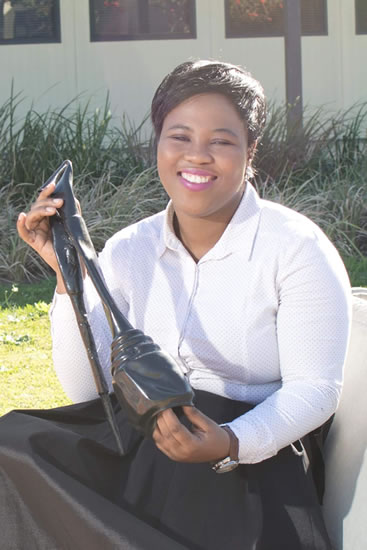 Sandiswa Qayi’s device, Hot Spot, which can be fitted onto any geyser and saves energy by only boiling a certain amount of water instead of all the water in the geyser, led to her launching her own business, Amahlathi Eco-Tech (AET) Africa, last year.
Sandiswa Qayi’s device, Hot Spot, which can be fitted onto any geyser and saves energy by only boiling a certain amount of water instead of all the water in the geyser, led to her launching her own business, Amahlathi Eco-Tech (AET) Africa, last year.
Qayi won the Youth-led Business Award in this year’s Global Clean Tech Innovation Programme for small and medium-sized enterprises.
The company received seed funding to develop the device last year and Qayi is in the final phase of finishing Hot Spot’s production – all tests in relation to device performance, water testing and material testing have been done.
“Since last year we secured seed funding from the Innovation Hub and Technology Innovation Agency, which was used to develop the product. We needed to test Hot Spot, in terms of health and safety compliance, particularly for water safety and to make sure that the material doesn’t result in any harmful substances inside the water. We also refined the product design so that we can get it ready for commercialisation,” she said.
How does Hot Spot work?
Qayi says Hot Spot enables users to operate the geyser like a kettle. In other words, when a user wants to make two cups of tea, they do not fill up the entire kettle with water, but only with an estimated amount.
Hot Spot heats up a specific amount of water and moves it to the top of the geyser, through to the tap.
“If you need 20 litres to have a shower or bath, then you only heat up the 20 litres you need and then switch your geyser off. This means you can switch your geyser on or off when you need it, and only use the amount of water you need.
“The difference between Hot Spot and the geyser timer is that with Hot Spot, as soon as hot water is heated, it flows to the top and to the outlet — which is where your tap is.
“The way a geyser is designed, you have to wait one and a half hours to get hot water because it heats up all the water.
“With Hot Spot hot and cold water never mix.”
This means that users can get up to 50 litres of hot water in 30 minutes, heated to 50 degrees celsius.
Qayi says Hot Spot bagged another award in June 2017. She walked away with a gold award in Energy Efficiency under the Ecological Award category at this year’s Eco-Logic Awards, hosted by The Enviropaedia.
AET Africa’s primary goal is to get the product fitted to the existing seven million geysers on the power grid. Qayi said they hope to improve energy efficiency to help South Africans who cannot afford to have hot water due to the high costs associated with operating an electric geyser.
Female brick maker cements her future
Female brick maker cements her future LondekileThanks to a loan from a provincial development agency, a KwaZulu-Natal woman is laying solid foundations in the construction industry.
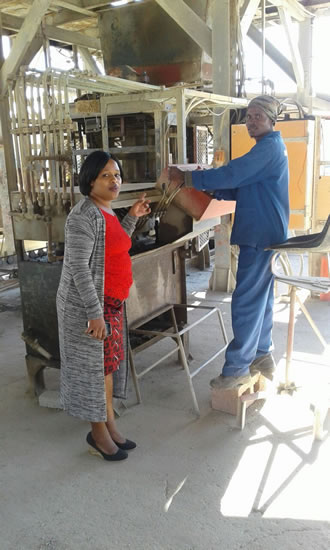 Thokozane Masikane-Zondi knows a thing or two about building. That the entrepreneurial brick maker has a foot in the door of the construction industry became evident in April when she won the R30 000 Micro-business of the Year prize at Ithala Development Finance Corporation’s 2017 Business Achiever Awards.
Thokozane Masikane-Zondi knows a thing or two about building. That the entrepreneurial brick maker has a foot in the door of the construction industry became evident in April when she won the R30 000 Micro-business of the Year prize at Ithala Development Finance Corporation’s 2017 Business Achiever Awards.
Ithala is KwaZulu-Natal’s development finance agency and the platform from which Masikane-Zondi was able to grow her business.
The 40-year-old Pietermaritzburg woman grew up with little financial security which meant she was unable to acquire a tertiary education. After school, she worked at Checkers and volunteered at the South African Police Service. When this did not lead to a permanent post, she took a leap into the unknown and started manufacturing construction blocks.
Tiba T Trading Enterprise was registered in 2006. A few small projects came Masikane-Zondi’s way before she got her breakthrough – a contract from Vulindlela Development Association to supply SABS quality-approved blocks for an RDP housing project.
Helping in building the business
The contract meant that production had to be increased, which meant the company needed funding to buy more equipment. After being turned down by commercial banks or offered uncompetitive interest rates, she secured a R800 000 loan from Ithala.
Before then, the company could make only 800 blocks a day but today it produces 19 000 a day. It employs 10 people on a permanent basis and nine casual employees.
Masikane-Zondi attributes her business success to sheer hard work, resilience and having a financial institution that believed in her. Her greatest rewards are being able to help families earn a living from the jobs she has created and helping her community to build their dream homes.
Not fazed by the male-dominated construction industry, she is surging ahead to fulfill her dream of landing large-scale projects and branching into transport and logistics.
Advice for entrepreneurs
Masikane-Zondi’s advice to aspiring business people is to work hard.
“Be hands-on in your business. Starting a business is like raising a baby – it needs you all the time.
“Do not use money for the business on your own needs. Business money is for business and your salary is for your needs. Once you take money from the business and use it on your own needs, the business suffocates,” she said.
She encouraged all current and aspiring KwaZulu-Natal entrepreneurs looking for financial assistance to contact Ithala, especially the youth and women.
Ithala’s primary focus is to increase the participation of black people in all sectors of the economy.
It was in June declared a finalist in the Vision 2030 Awards in the Industrial Action Plan Award category in recognition of its contributions to moving the nation forward, as a leader in the sector and as a proponent of the National Development Plan.
Shoemaker leaves a footprint
Shoemaker leaves a footprint LondekileFunding from the National Youth Development Agency has helped a Bloemfontein woman become a successful business owner.
When Angela Mkhabela started repairing shoes, she never dreamt that she would one day be a successful businesswoman.
Mkhabela officially registered Goodhope Shoe Repairs and General 12 years ago. “I knew that I wanted to make it big, but I never thought it would be this great,” she said.
“But now that I am here, I want to take the business further and make it grow bigger,” she added.
Mkhabela works with all sorts of leather, from cow, goat, crocodile, ostrich and lizard hides, to create accessory wonders, such as shoes, belts, bags and wallets, and has recently ventured into jackets. Goodhope is one of the very few 100 per cent women black-owned companies in the country that manufactures leather goods from scratch.
Mkhabela said one of the challenges she has to deal with is the fact that people are surprised that “a woman is the one behind the desk waiting to fix their shoes”.
Nonetheless, she said her company and her products are getting positive feedback from customers. “People love our products and support us; it is really overwhelming.”
Most of Mkhabela’s customers come through referrals, a sign that Goodhope’s work is really appreciated by its clients.
Mkhabela’s venture has been so successful that she has opened a shop in the city centre of Bloemfontein in the Free State province, and aims to grow the business even further by adding four or five branches throughout South Africa.
She recently returned from a trip to China where she learnt about shoe manufacturing techniques, alongside other South Africans in the shoe manufacturing industry.
This entrepreneur said her secret to success is having a passion and love for what she does. “Being loyal to my customers and going all out for their needs” have helped establish the reputation that Goodhope enjoys, she added.
A much-needed boost
Mkhabela received R50 000 in funding from the National Youth Development Agency in 2015, which helped her buy machinery.
“The funding was really helpful because it assisted me to increase production and afforded me the opportunity to hire staff to help me out because I used to work on my own,” she said.
While Goodhope currently has one part-time and two permanent employees, Mkhabela hopes to provide more employment going forward. “I want to see the business grow bigger and stronger, to the point where we manufacture about 5 000 pairs of shoes a month, from a big factory with a minimum of 300 staff members,” said Mkhabela.
HSRC focuses on HIV prevention
HSRC focuses on HIV prevention LondekileThe Human Sciences Research Council has opened a satellite office in Sweetwaters, in Pietermaritzburg, KwaZulu-Natal, to test approaches to HIV prevention.
The Human Sciences Research Council (HSRC) satellite office in the Vulindela District Municipality aims to test the comparative advantage, including the cost-efficacy, of two approaches to HIV prevention using Voluntary Counselling and Testing (VCT).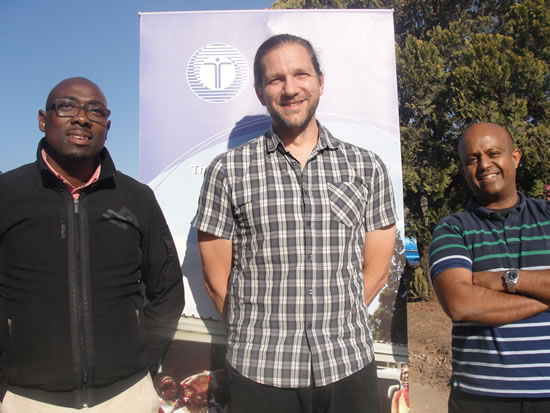
Site manager Dr Alastair van Heerdeen said that the research addresses issues faced by the community, such as poverty inequality and the quality of healthcare.
“But our research is not just about a simple technical solution. It is about social psychological and environmental barriers that affect these solutions, like gender and stigma or the fact that healthcare services do not operate outside of working hours.”
An alternative model
Dr van Heerdeen said the project suggests an alternative model to the standard facility-based VCT services in the country. “For example, community mobilisation for testing, immediate test results made available by mobile services in communities, and linking testing to post-test support services for both HIV-positive and HIV-negative individuals and their social networks.”
Research technical manager Phillip Joseph said the importance of their work lies not with only research outcomes, but in the research process as well.
“Our collaboration is significant and all of our research progress must be genuine and culturally accepted,” he said, adding that the clinic worked hand in hand with the Department of Health.
He added that the mobile clinic programme attracts hard-to-reach target populations that are not serviced by a heath facility.
Calling on men
“Our mobile clinic is targeting men who usually fall by the way side. It is not that men do not want to test, but they are working. On Saturdays they are busy with other things, such as funerals. They do not get time to go to the clinic. They hate queues. We have a programme, named Zwakala Ndoda, where we call all men to come and test.
“After 25 months of intervention delivery, 5 105 clients had participated in our mobile VCT services; with a high testing uptake rate of 97 per cent. In addition, we attract relatively equal numbers of men (45 per cent) and women (55 per cent). With respect to age, more than 72 per cent of our testers fall between the ages of 16 and 32, with a median testing age of 24,” he said.
Dr van Heerdeen said all research programmes are funded externally and the community always participates.
“We thank the many South Africans whose households were randomly pre-selected to participate, and their families have gladly accepted to answer the socio-behavioural survey questions and offered a few drops of blood for HIV testing,” he said.
SA’s youngest hospital CEO
SA’s youngest hospital CEO LondekileDespite being in her early 30s, CEO Dr Nokwethemba Mtshali-Hadebe has plans to turn Bertha Gxowa Hospital into one of the finest in the country.
 The first thing that Dr Nokwethemba Mtshali-Hadebe – South Africa’s youngest hospital CEO – does when she gets to Bertha Gxowa Hospital every morning is walk through the healthcare facility to get a sense of the challenges that need to be addressed.
The first thing that Dr Nokwethemba Mtshali-Hadebe – South Africa’s youngest hospital CEO – does when she gets to Bertha Gxowa Hospital every morning is walk through the healthcare facility to get a sense of the challenges that need to be addressed.
She then meets with staff in the respective wards to diagnose issues that need addressing, be it long queues, staff attitude or staff morale, with the aim of turning the situation around and improving the patient experience.
This is but one of several approaches to service delivery that Dr Mtshali-Hadebe took after being permanently appointed CEO at age 31.
After doing her walkabout and answering urgent emails, she then moves on to exco meetings, before conducting performance reviews and coaching sessions with the hospital’s managers.
In an interview with Vuk'uzenzele, and as the country commemorates Women’s Month, Dr Mtshali-Hadebe said since becoming CEO, she has focused her attention on improving the overall patient experience by investing in staff coaching.
Tackling Challenges
She said the hospital’s main challenges had to do with long queues or waiting times – which is a Ministerial priority – as well as staff attitudes.
“I found a very glaring environment of employees who were not engaged. The organisational culture of the hospital had to be changed because when employees are engaged, they become more productive and that results in better patient experiences and improved clinical outcomes.”
She said that the perception that public hospital patients don’t get treated well needs to be changed and that necessitates a change in staff attitude.
To achieve this, she introduced merit awards for individual staffers and teams from different wards. Employees are recognised for going beyond the call of duty.
Prior to being appointed CEO in May last year, Dr Mtshali-Hadebe, a University of KwaZulu-Natal graduate, acted in the position for a year in 2015. She previously worked for Metropolitan Life before taking up a position as a clinical manager for the Far East Rand Hospital.
She said the past year has been a journey for her, not only in terms of personal development, but how the hospital has changed the way it operates.
“I am happy to say that we have reduced the number of complaints directed at the hospital by dealing with complaints as and when they happen. Also, we have been able to reduce the number of complaints related to staff attitudes,” she said, adding that they are, however, not yet where they need to be.
Dr Mtshali-Hadebe said that when she started out, she had to prove that she could steer the ship in the right direction despite her age. Now, her capabilities are now accepted and she is free to focus her attention on working with management to ensure that they institutionalise the hospital’s vision and are able to impart it to the staff complement of just over 700 people.
Poverty, inequality contribute to violence
Poverty, inequality contribute to violence LondekileAugust has been dedicated to raising awareness of violence against women and children and highlighting ways in which women can help move South Africa forward.
Socio-economic circumstances contribute to violence against women and children, the Director-General of the Department of Women, Jenny Schreiner, believes.
She said that social distress is fuelled by high levels of inequality and unemployment, as well as the recession and resulting lack of job security. “We put our families under enormous stress. When you are under stress, it comes out somewhere. It is inexcusable, however, that it comes out in the form of violence.”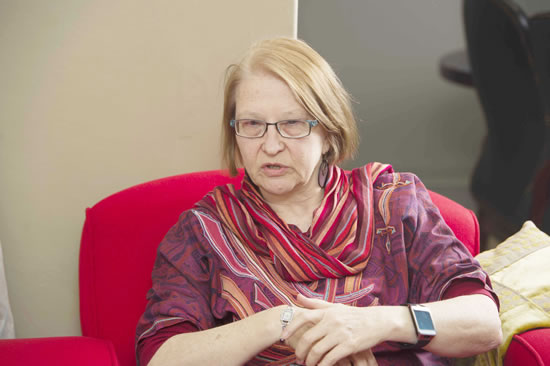
She added that South Africa has a social security policy that enables social distress to be moderated through the issuing of social grants.
According to Schreiner, a combination of triggers compound social stress. One of these is patriarchy, which is a system of society in which men hold the power and women are largely excluded from it. Patriarchy contributes to the level of violence against women and children.
Change starts at home
Schreiner said that her department helps mitigate this violence through advocacy programmes, including the National Dialogues initiative, which raises awareness about violence against women and children.
Schreiner said what the country is faced with is a gender issue and not a women’s issue.
“We need men to be role models and boy children to know that there are other solutions besides violence against women. To change things, South Africa needs to start in the home.”
She said the culture of family members keeping quiet when someone is abused needs to stop. Faith-based organisations and religious leaders must play a part in moral regeneration.
“Violence of any description is morally wrong. Our Constitution says we have a right to be safe.”
Women unite to move South Africa forward
This year’s Women’s Month theme is Women unite to move South Africa forward, which speaks to the core of women emancipation.
Schreiner said it is critical for women to organise themselves properly to ensure that they receive what is due to them as stated in the Constitution.
She said women of today have the ability to move the country forward, just like the more than 20 000 women of 1956 did, when they marched to the Union Buildings in protest against the extension of pass laws to women.
The march against the pass laws was organised by the Federation of South African Women which famously challenged the idea that a woman’s place is in the kitchen.
The main 2017 National Women’s Day celebration on 8 August was held in Galeshewe in the Northern Cape, with an official address by President Jacob Zuma.
According to Statistics South Africa, in 2011 the Northern Cape had a population of 1 145 86,1, of which 50.69 per cent were female and 49.31 per cent were men.
The Provincial Growth and Development Strategy further indicates that the Northern Cape faces chronic underdevelopment with its social, economic and cultural manifestations through poverty, unemployment and rural-urban income inequality, which still continue.
Zim, SA on protecting children
Zim, SA on protecting children LondekileWith the number of unaccompanied and undocumented minors coming to the country on the increase, South Africa is committed to safeguarding every child.
In Limpopo, along the Zimbabwean border, at least 70 unaccompanied minors have been taken under the wing of the authorities.
A delegation from the Zimbabwean Ministry of Public Service, Labour and Social Welfare recently took part in a five-day bilateral meeting with the Department of Social Development to look into the plight of Zimbabwean unaccompanied and separated minors living in South Africa.
The meeting included visits to child and youth care centres across the country. At the Tshitandanani Child and Youth Care Centre, in Makhado, children shared their stories with the delegation.
Fifteen-year-old Simon Jikiza* from Masvingo, in Zimbabwe, crossed the border illegally in 2016, after losing both of his parents. He tried to sell eggs in Zimbabwe, but this proved unsustainable and he decided to come to South Africa. “From Masvingo Village to Beit Bridge is about 288 kilometres and I walked with a plan, going wherever I could survive and find a better life,” he said.
Simon is now in Grade 8 and wants to write his life story so that other countries can understand the plight of children in Zimbabwe. He is adamant that he is now better off and safer at the Tshitandanani Child Care Centre.
During an Indaba on unaccompanied minors, held in June, delegates heard that the majority of unaccompanied minors enter South Africa illegally. Their reasons include searching for better opportunities, mainly in the form of work or schooling, or to join family members already in the country.
Looking after all children
Unaccompanied minors are defined as children who have been separated from both parents and other relatives and are not being cared for by an adult who, by law or custom, is responsible for doing so.
In November 2011, South Africa and Zimbabwe signed a Memorandum of Understanding (MOU) on Social Development to look into social security, welfare services, community development and unaccompanied and separated minors, amongst other issues.
The Department of Social Development said it is unable to provide accurate figures on the number of unaccompanied and separated minors in the country. The department’s spokesperson, Lumka Oliphant, said that South Africa - through the Children’s Act, the United Nations Convention on the rights of the child and the African Charter on the Rights of the Child - is obligated to look after all children within its borders.
Making progress
Oliphant said significant progress has been made, including the introduction of standard operating procedures which help unaccompanied children. The South African steering committee is led by the Department of Social Development and consists of officials from the departments of Justice, Health, Home Affairs, Basic Education and International Relations and Cooperation and the South African Police Service.
The National Steering Committee includes international agencies, such as the United Nations Children’s Fund, United Nations High Commissioner for Refugees, Save the Children, International Organisation on Migration and Lawyers for Human Rights. ñ SAnews.gov.za
* Name has been changed to protect identity.
Eastern Cape animal health students get a boost
Eastern Cape animal health students get a boost JoyThe Health and Welfare Seta has provided R15.9 million to help fund education for students from poor and rural families, who didn’t have money to pay fees.
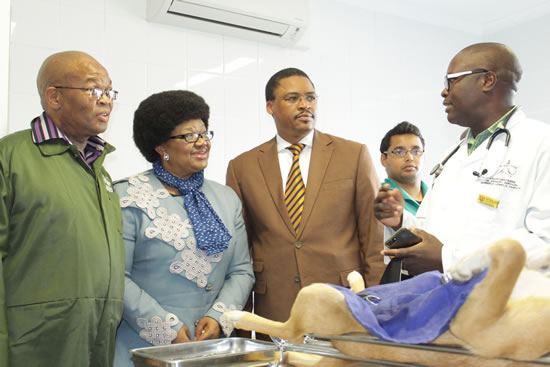 The Eastern Cape Department of Rural Development and Agrarian Reform and the Health and Welfare Seta has awarded R15.9 million in bursaries to 105 students at the Tsolo Agriculture and Rural Development Institute who are studying towards a diploma in animal health.
The Eastern Cape Department of Rural Development and Agrarian Reform and the Health and Welfare Seta has awarded R15.9 million in bursaries to 105 students at the Tsolo Agriculture and Rural Development Institute who are studying towards a diploma in animal health.
To date, 225 Tsolo Institute students have received R23.9 million in bursary funding from the Health and Welfare Seta.
Second year student Pretty Morrison said without the bursary she would have struggled to pay for her studies, and it helps her to focus on getting higher marks. “The bursary means that I can be educated and become an animal health technician. I can gain experience when I come out of college, and I can go out and help the community.”
She said she wanted to be an entrepreneur: “I want to start my own sheep farm business because I want to focus on wool production.” After completing her studies she planned to invest some of her stipend in building her business.
Tsolo Institute’s SRC president Zubenathi Ngxishe said bursaries open access to education for youth to move the country forward.
Tackling poverty
“Getting the bursary means I will be able to learn and be equipped to work. [Without the bursary] I wouldn’t have been able to pay my fees, as last year I only managed to pay my registration fees,” said Ngxishe, who plans to open a farm to treat animals in rural areas.
Health and Welfare Seta Eastern Cape Manager Welekazi Mangaliso said the bursaries are also reducing poverty through a monthly stipend which students share with their families who have no source of income.
“One of the main purposes of the Seta is to redress past imbalances. Previously not everyone was able to access scarce skills. This qualification offers scarce skills that will equip these learners to achieve whatever they want in life. They can be employed and they can be self-employed,” said Mangaliso.
MEC of Rural Development and Agrarian Reform Mlibo Qoboshiyane said it was good to see government entities partnering to support students to get a quality education. Qoboshiyane urged students to take their studies seriously. “I am optimistic that these students will be of value and assets in their communities.”
Upgrading infrastructure
The department is upgrading the Tsolo Agriculture and Rural Development Institute’s infrastructure. “We invested about R20 million to upgrade infrastructure facilities like the vet clinic, crop sheds, postmodern facility, palisade fence, dairy parlour and student residences,” said Qoboshiyane.
The Tsolo Institute offers diploma courses in animal health, breeding and genetics, aquaculture and wildlife, non-ruminant animal production, occupational communication, animal handling and welfare, veterinary anatomy and physiology, veterinary microbiology and immunology among others.
The department also engaged AgriSETA to contribute to students’ education. The OR Tambo District and Mhlontlo Local municipalities also provided bursaries to some students from their areas.
AgriSETA contributed R500 000 for 20 students, which will be transferred to the 2017 intake.
Mhlontlo Local Municipality awarded R263 000 in full bursaries to 12 students for tuition and boarding for one year. It also provided R407 000 to 22 first year students from villages within Mhlontlo.
In 2017, OR Tambo District Municipality funded two students to the amount of R43 200, inclusive of a R4 000 book allowance for each student.
Growing women farmers
Growing women farmers JoyThe Department of Small Business Development, South African Breweries (SAB) and the Agricultural Research Council hope to help 5 000 women maize farming co-operatives join the breweries supply chain by 2020.
Ekangala Primary Co-operative is a 100 per cent women-owned agriculture business and was one of the first of 11 co-operatives to join the Women in Maize programme in 2016. Before joining the programme, the women of Ekangala had just 15 hectares under maize cultivation. Now they have increased that to 45 hectares and expect to harvest 225 tons of maize.
The programme’s 120 female farmers harvested 1 800 hectares of maize in Gauteng, KwaZulu-Natal, Mpumalanga and North West last year. The impressive first year harvest represents just nine per cent of SAB’s needs.
As more farmers are signed up, SAB hopes to increase the number of women farmers in their supply chain.
Over the next five years, the multimillion rand investment by SAB will draw in 5 000 women farmers to become preferred suppliers to the brewer. The intention is to stimulate local economies by giving them a guaranteed market for their crops.
As SAB’s Executive Director Corporate Affairs and Transformation, Monwabisi Fandeso, explained when the group celebrated the first harvest in the programme, “We work with small-scale farmers to overcome these challenges while ensuring land is used responsibly, food supply is secure, biodiversity is protected and crops can be accessed at reasonable prices.”
As well as market access, farmers in the Women in Maize programme get financial assistance and help with skills training. For SAB, sourcing from established local supply chains helps to reduce costs and improve efficiencies.
Stronger rural economies will also create jobs and strengthen local economies, which will help government meet its goal of one million agricultural jobs created by 2030.
“This initiative is an example of how much we can achieve when government and the private sector work together. The task of ensuring that the Ekangala Co-operative and others across the country grow and thrive, rests on our collective shoulders,” said Small Business Development Minister Lindiwe Zulu at the celebration of the first harvest.
Free tourism grading for small businesses
Free tourism grading for small businesses Estelle GreeffThe North West provincial government has identified tourism as one of the sectors that can boost economic development in the province’s small towns.
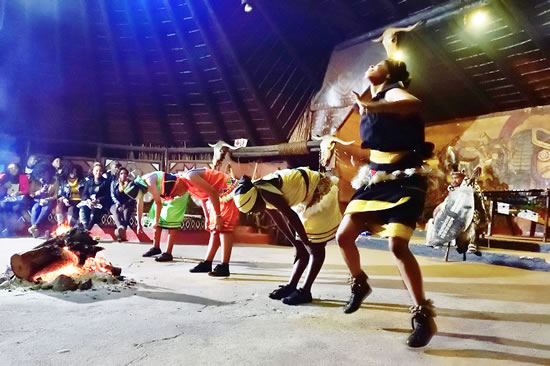 To attract tourists to the overlooked but vibrant and history-rich small towns, the province has partnered with the Tourism Grading Council of South Africa (TGCSA) to grade small establishments at no cost.
To attract tourists to the overlooked but vibrant and history-rich small towns, the province has partnered with the Tourism Grading Council of South Africa (TGCSA) to grade small establishments at no cost.
The provincial Department of Tourism will cover the costs because, as North West Tourism MEC Desbo Mohono explained, “Grading your bed and breakfast or guesthouse might not seem important, especially if you own a small establishment, but it's actually vital for long-term success. Tourists and business travellers alike are more likely to stay at a graded establishment than in one without a grading, as they can then be assured of predictable and guaranteed levels of quality.”
With this initiative the province hopes to encourage tourists to discover Bokone Bophirima beyond the Madikwe Game Reserve and Sun City. The province is hoping to boost cultural tourism in rural areas where local beaders and potters live and work.
The province recently concluded their Villages, Township and Small Dorpies (VTSD) Economies and Entrepreneurship Outreach programme. Communities were introduced to new services available from the province, including business support programmes. Entrepreneurs were given assistance and advice on how to access funding and investment to create sustainable tourism businesses.
The number of tourists visiting South Africa reached 10 million in 2016 and the national Department of Tourism expects it to keep increasing. A TGCSA grading is not required to run a tourist-relatedbusiness. But, as MEC Mohono points out, “A graded establishment has access to a basket of benefits through TGCSA. These benefits include boosting customer confidence and also a marketing aspect which yields sustainable business growth.”
Buisnesses are graded on factors like amenities and facilities available, food, beverages and location. The number of stars awarded are based on the inspector’s report. The business can then display the TGCSA plaque on their premisis.
Beautifying Randfontein environment
Beautifying Randfontein environment Estelle GreeffThe Rand West Local Municipality is investing in infrastructure to ensure its communities have a better quality of life.
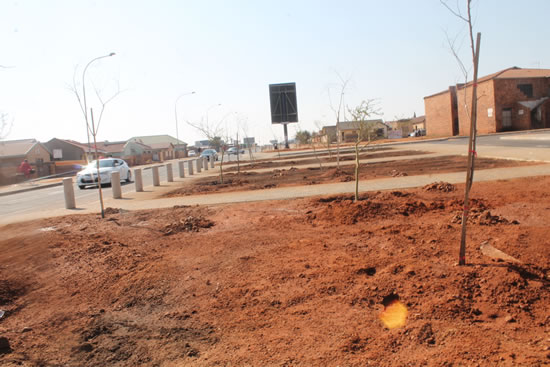 The Rand West Local Municipality has embarked on infrastructural development in the region and is fixing roads and building sidewalks in two Randfontein townships, Mohlakeng and Toekomsrus.
The Rand West Local Municipality has embarked on infrastructural development in the region and is fixing roads and building sidewalks in two Randfontein townships, Mohlakeng and Toekomsrus.
The aim is to beautify the area to make it more appealing to locals and investors. “Essentially, there is no town where you will have investors if your roads are not in good condition,” says municipality spokesperson Tshidiso Tlharipe.
All main intermediary roads in the region will have sidewalks and roads in neighbouring townships will be properly tarred, Tlharipe says, adding that potholes will be repaired.
“We are addressing the challenge to create a pleasurable driving experience for locals and visitors. We are building sidewalks for the first time in Mohlakeng and intend beautifying the business precinct, because there’s a lot of activity happening there.”
The project has resulted in more than 100 job opportunities being created for locals.
To date, 24 of 27 roads have been tarred and R32 million has been earmarked for upgrades, which should be complete in September.
The sidewalks will soon be completed, with the first phase of this project estimated at R10 million.
Work has been completed on Ralerata Street and construction is now taking place on Finsbury and Simunye streets as well as the intermodal business sectors like Sandi and Lembede streets.
“We believe that this will give local businesses in the area a good look that will in turn boost the township economy,” says Tlharipe.
He notes that the municipality has had good feedback from community members on the work done so far.
Local resident Bella Moshuping says the projects are making their environment a better place to live. “Our township is really looking beautiful and we are truly grateful to the municipality for the hard work they’ve put in.
“The refurbishments truly make us proud of being from such a place, which is clearly well taken care of,” she says.
Jobs: Justice and Constitutional Development Aug 2017
Jobs: Justice and Constitutional Development Aug 2017 Estelle GreeffFamily Advocate LP7 (3 posts)
Reference: 004/17/NC: Centre: Office of the Family Advocate Upington
Reference: 17/01/KZN: Centre: Family Advocate Newcastle
Reference: 17/VA05/NW: Centre: Office of the Family Advocate NW- Rustenburg
Package: R684 423 – R737 313 per annum. (Salary will be in accordance with OSD determination). The successful candidate will be required to sign a performance agreement.
Requirements: An LLB Degree or recognized 4 year legal qualification; Admitted as an Advocate. The right of appearance in the High Court of South Africa; At least 5 years appropriate post qualification litigation experience; A valid driver’s licence.
Enquiries: Kimberley: Adv. P Molokwane Tel: 053 833 1019
Enquiries: KwaZulu-Natal: Mr JN Mdaka Tel: 031 372 3000
Enquiries: Mafikeng: MS G Tabane Tel: 018 397 7058
Court Manager (15 posts)
Reference: 2017/11/GP; Centre: Magistrate Daveyton
Reference: 2017/10/GP; Centre: Magistrate Vanderbijlpark; Note: The post is a re-advertisement; candidates who previously applied are encouraged to re-apply)
Reference: 001/17/NC Centre: Magistrate Office: Springbok,
Reference: 002/17/NC Centre: Magistrate Office: De Aar
Reference: 003/17/NC Centre: Magistrate Office: Kuruman
Reference: 6/17/EC Centre: Magistrate Court: Port Elizabeth
Reference: 7/17/EC Centre: Magistrate Court: New Brighton
Reference: 8/17/EC Centre: Magistrate Court: Maluti
Reference: 9/17/EC Centre: Magistrate Court: Mount Frere
Reference: 17/02/KZN Centre: Magistrates Office, Eshowe,
Reference: 17/03/KZN Centre: Magistrate Office Ingwavuma (NOTE: The post is a re-advertisement)
Reference: 17/04/ kzn Centre: Magistrate Office: Madadeni
Reference:17/05/ kzn Centre: Magistrate Office: Pietermaritzburg
Reference: 31/17/WC Centre Magistrate Offices: Mossel Bay
Reference: 30/17/WC Centre Magistrate Offices: Malmesbury
Salary: R417 552 – R491 847 per annum. The successful candidate will be required to sign a performance agreement.
Requirements: Three (3) year qualification in Administration (NQF level 6) and / or National Diploma in Services Management (NQF level 5) plus the module on Case Flow Management or equivalent qualification; At least 3 year’s managerial or supervisory experience; Knowledge of an experience in office and district administration; Knowledge of Public Financial Management Act (PFMA); Experience in managing Trust (Third Party Funds) and Vote Account; A valid driver’s licence; Experience in the Court environment will be an added advantage.
Enquiries: Gauteng: Ms RR Moabelo Tel: 011 332 9000
Enquiries: Kimberley: Ms D Kistoo Tel: 053 8021300
Enquiries: Eastern Cape: Mrs. L Pretorius Tel: 043 702 7000
Enquiries: KwaZulu-Natal: Mr J.N. Mdaka Tel: 031 372 3000
Enquiries: Atlantis: Mr D Xegwana Tel: 023 312 1112 and George: Mr M Cerfonteyn Tel: 044 802 5800
Assistant Director: Strategic Support (Office Manager)
Reference: 88/17/WC
Salary: R334 545 – R394 065 per annum. (The successful candidate will be required to sign a performance agreement)
Requirements: Three years Bachelor’s Degree in Law or three years National Diploma in Public Administration or equivalent qualification; Minimum of 5 years middle management experience; Knowledge of Departmental strategic goals; Knowledge of the Public Service and the working of Government; A valid driver’s licence.
Enquiries: Ms L Arenz Tel: 021 462 5471
Social Worker/ Family Counsellor Grade 1 - 3 (4 posts)
Reference: 17/06/KZN Centre: Office Of The Family Advocate, Durban (NOTE: The post is a re-advertisement, candidates who have applied before must re-apply)
Reference: 17/07/KZN: Centre: Office Of The Family Advocate, Newcastle
Reference: 17/08/KZN: Centre: Office Of The Family Advocate Pietermaritzburg
Reference: 01/17/LMP: Centre: Family Advocate: Polokwane
Salary: R226 686 – R395 685 per annum. (Salary will be in accordance with OSD determination). The successful candidate will be required to sign a performance agreement.
Requirements: Bachelor Degree in Social Work or equivalent qualification which allows for professional registration with the SACSSP as Social Worker; Appropriate experience in social work after registration with SACSSP; Knowledge and experience in Mediation; Court Experience in Evidence; Knowledge and application of Family Law, including Mediation in certain Divorce Matters Act , Children’s Act, Maintenance Act and Domestic Violence Act (inclusive of Hague Convention on International Child Abduction); A valid drivers’ licence.
Enquiries: KwaZulu-Natal: Mr J.N. Mdaka Tel: 031 372 3000
Enquiries: Limpopo: Mr Masemola TD. Tel: 015 287 2025/2026
Maintenance Officer MR1- MR5 (2 posts) (re-advertisement)
Reference: 17/07/FS
Reference: R174 606 – R818 301 per annum. (Salary will be determined in accordance with OSD). The successful candidate will be required to sign a performance agreement.
Requirements: An LLB Degree or recognized 4 year legal qualification; Extensive knowledge of the maintenance system; Proficiency in at least two official languages; Understanding of all services and procedures in the area of maintenance and other areas of family law; A valid driver’s licence.
Enquiries: Ms. NM Dywili Tel: 051 407 1800.
Maintenance Officer (MR-1 – MR-3) (14 Posts)
Reference: 012/17/NC Centre: Magistrate’s Office Office Colesberg
Reference: 013/17/NC Centre: Magistrate’s Office Office: Kimberley (Re-advertisement); Centres: Magistrate Office: Colesberg, and Magistrate Office Kimberley
Reference: 17/09/KZN: Centre: Magistrate’s Office, Chatsworth (1)
Reference: 17/10/KZN: Centre: Magistrate’s Office: Durban (2)
Reference: 17/11/KZN: Centre: Magistrate’s Office: Emlazi (2)
Reference: 17/12/KZN: Centre: Magistrate’s Office: Empangeni (1)
Reference: 17/13/KZN: Centre: Magistrate’s Office: Hlanganani (1)
Reference: 17/14/KZN: Centre: Magistrate’s Office: Madadeni (1)
Reference: 17/15/KZN: Centre: Magistrate’s Office: Nqutu (1)
Reference: 17/16/KZN: Centre: Magistrate’s Office Verulam (1)
Reference: 17/Va04/NW: Mr1 – Mr4: Centre: Magistrate’s Office Bloemhof
Reference: 17/Va08/Nw: Mr1 – Mr4: Centre: Magistrate ’S Office Potchefstroom
Salary: R174 606 – R258 672 per annum. (Salary will be determined in accordance with OSD determination). The successful candidate will be required to sign a performance agreement.
Requirements: An LLB Degree or recognized 4 year legal qualification; Extensive knowledge of the maintenance system; Proficiency in at least two official languages; Understanding of all services and procedures in the area of maintenance and other areas of family law; A valid driver’s licence.
Enquiries: Kimberley: Mr. J. Tope Tel: 053 802 1300
Enquiries: KwaZulu-Natal: Mr J.N. Mdaka Tel: 031 372 3000
Enquiries: Mafikeng: Ms. G Tabane Tel: (018 397 7058
Registrar MR1 – MR5 (Note: this is a re-advertisement applicants who previously applied are encouraged to re-apply.)
Reference: 17/06/FS
Salary: R174 606 – R818 301 per annum. (Salary will be in accordance with OSD). The successful candidate will be required to sign a performance agreement.
Requirements: LLB degree or a four year recognized legal qualification. A valid driver’s licence.
Enquiries: Ms. NM Dywili Tel: 051 407 1800.
Closing date: 21 August 2017
NOTE: Interested applicants may visit the following website: www.justice.gov.za or www.dpsa.gov.za to view the full job specification of the above positions. Applications must be submitted on Form Z83, obtainable from any Public Service Department or on the internet at www.gov.za. A Z83 form & CV must be accompanied by original certified copies of qualifications and identity document and a driver’s licence where necessary. A SAQA evaluation report must accompany foreign qualifications. Applications that do not comply with the above mentioned requirements will not be considered. All shortlisted candidates for SMS posts will be subjected to a technical exercise that intends to test relevant technical elements of the job, the logistics of which will be communicated. Following the interview and technical exercise, the selection panel will recommend candidates to attend a generic managerial competency assessment (in compliance with the DPSA Directive on the implementation of competency based assessments). Candidate will complete a financial disclosure form and also be required to undergo a security clearance. If the candidate is applying for an OSD post, certificates of service must be attached to the CV.
The DOJ&CD is an equal opportunity employer. In the filling of vacant posts the objectives of section 195 (1) (i) of the Constitution of South Africa, 1996 (Act No: 108 of 1996), the Employment Equity imperatives as defined by the Employment Equity Act, 1998 (Act No: 55 of 1998) and relevant Human Resources policies of the Department will be taken into consideration.
Reasonable accommodation shall be applied for People with Disabilities including where drivers licence is a requirement. Shortlisted candidates will be subjected to a personnel vetting process. Correspondence will be limited to short-listed candidates only. If you do not hear from us within 3 months of this advertisement, please accept that your application has been unsuccessful. The department reserves the right not to fill these positions. Women and people with disabilities are encouraged to apply and preference will be given to the EE Target.
Tel: 012 315 1111 Private Bag X81, Pretoria, 0001 Momentum Centre, 329 Pretorius Street, Pretoria www.justice.gov.za @dojcd_ZA at DOJCD
Looking for a government job?
Looking for a government job? Estelle GreeffGovernment jobs are advertised on the Department of Public Service and Administration website, www.dpsa.gov.za, in our Vuk’uzenzele newspaper, and in other reputable publications.
Please be aware of any job offers that ask for any form of payment – you will never be asked to pay a fee to apply for any government job.
Digital economy vital, say BRICS ministers
Digital economy vital, say BRICS ministers Estelle GreeffInternational relations
BRICS countries’ commitment to digital development is aligned with South Africa’s Internet for All initiative.
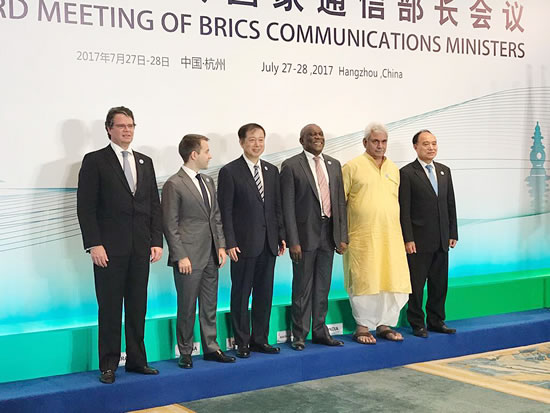 Speaking at the third BRICS Communications Ministers meeting in Hangzhou, China, the Minister for Telecommunications and Postal Services, Dr Siyabonga Cwele, called for more innovation and co-operation in the trade group.
Speaking at the third BRICS Communications Ministers meeting in Hangzhou, China, the Minister for Telecommunications and Postal Services, Dr Siyabonga Cwele, called for more innovation and co-operation in the trade group.
“We need to enable BRICS countries to develop their own technologies, driven by SMMEs, which can be sold within the greater market of BRICS countries,” the Minister said in his opening remarks.
BRICS governments consider ICT as the giant leap forward that will help grow the economies of all five countries in the bloc. In 2016, the BRICS nations accounted for 23 per cent of global GDP and half of the world’s population.
As Russian Minister of Telecoms and Mass Communications Nikolay Nikiforov explained: “We believe that every single citizen of these countries will be connected to the network, or mobile devices, which will equal almost half of the world’s ICT market.”
Security and opportunity
In a statement after the meeting, all five ministers recognised the importance of the digital economy in creating new economic growth. The statement went further to recognise the security threats the 4th Industrial Revolution posed.
“We should strengthen dialogue on how to respond to security threats and establish effective mechanisms to tackle cyber emergencies. More joint efforts will be made to build a safe and reliable network, and establish a proper internet governance system,” explained Liu Lihua, China’s Vice-minister of Industry and Information Technology.
Minister Cwele went on to say that co-operation must include infrastructure projects, especially the BRICS Cable that will connect the countries. This would boost co-operation between the countries in developing digital technologies, including 5G, cloud computing and the use of big data to drive policy.
The South African experience
Minister Cwele pointed out that South Africa has put ICT innovation at the heart of government’s economic development strategy.
The minister called on his BRICS counterparts to help the country meets its target of safe high-speed broadband for all South Africans by 2020. The Internet for All initiative aims to connect 22 million South Africans, especially rural and underserved parts of the country.
He invited BRICS partners to help ensure affordability, share e-skills and help communities to develop solutions to local problems.
Trade mission to Zambia a success
Trade mission to Zambia a success Estelle GreeffAfrica news
The joint meeting between South Africa and Zambia identified a need to create partnerships to address the structural challenges of poverty, unemployment and inequality.
The Department of Trade and Industry (the dti) has concluded a successful trade and investment mission to Zambia, identifying a number of business opportunities that exist between the two countries.
The mission, attended by representatives from 20 South African businesses, also identified a need to create much needed partnerships towards addressing the structural challenges relating to poverty, unemployment and inequality.
“We need to strengthen our comparative advantages and focus on the implementation commitments made through the Memorandum of Understanding on Economic Cooperation signed between our countries,” said Director of Export Promotion at the dti, Seema Sardha.
South Africa, she said, is intimately linked with the African continent “hence we ensure that our developmental agendas are interwoven as this relates to market integration as well as industrialisation”.
The mission to Zambia enabled South African companies to interact with leading private sector entities from agro-processing, agri-business; infrastructure, advanced manufacturing, energy, services, tourism infrastructure development and mining and capital equipment.
A top trading partner
It also presented a platform for South African companies that would like to export value-added products, and form joint-venture partnerships in Zambia to engage with their counterparts.
Zambia is one of South Africa’s top five trade partners in the SADC region with total bilateral trade amounting to R33 billion in 2016.
Sardha encouraged companies to take a long term view, especially when it comes to undertaking business exercises in Africa.
“It is imperative that the private sector advances the commitments made by President Edgar Lungu during the state visit to South Africa last year, towards realising the establishment of regional value-chains and manufacturing capabilities on the continent as outlined in Agenda 2063 and Southern African Development Community’s (SADC) Industrialisation Strategy and Roadmap,” Sardha said.
During the state visit in 2016, President Lungu and President Jacob Zuma reiterated the importance of ongoing economic cooperation between the two countries in terms of trade and investment. The bilateral Business Forum had met to explore more avenues for cooperation. - SAnews.gov.za
This month in history - Aug 2017
This month in history - Aug 2017 Estelle GreeffAfrica news
SADC turns 25
The Southern African Development Community (SADC) came into being 25 years ago in Windhoek, Namibia, on 17 August 1992 – replacing its predecessor, the South African Development Coordination Conference.
The focus of SADC turned to the integration of economic development whereas the SADCC had been formed in 1980 to advance the cause of national political liberation in southern Africa and reduce dependence on apartheid-era South Africa.
SADC members are united in striving for sustainable and equitable economic growth and socio-economic development; the promotion of common political values, systems and other shared values; and the consolidation and maintenance of democracy, peace, security and stability in the region.
SADC currently has 15 member states: Angola, Botswana, Democratic Republic of Congo, Lesotho, Madagascar, Malawi, Mauritius, Mozambique, Namibia, Seychelles, South Africa, Swaziland, Tanzania, Zambia and Zimbabwe.
This month South Africa takes over the chair of SADC and is host the 37the SADC Ordinary Summit of Heads of State and Government. Ways to work with the private sector to develop industry and regional value chains is one of the key topics on the agenda. (Source: www.sadc.int)
Chief Luthuli’s footsteps retraced
Chief Luthuli’s footsteps retraced Estelle GreeffSport, arts and culture
A heritage walk in the hometown of struggle icon Albert Luthuli not only commemorated his death 50 years ago, but highlighted the rich history of Groutville.
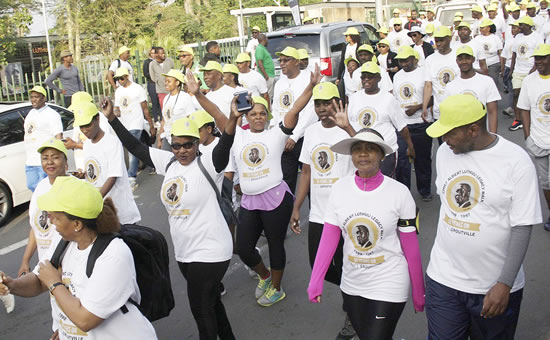 Over 500 people from KwaZulu-Natal and other provinces descended in Groutville in the north of the province for the second annual Chief Albert Luthuli Legacy Walk and Half Marathon to commemorate the icon and trace his final steps.
Over 500 people from KwaZulu-Natal and other provinces descended in Groutville in the north of the province for the second annual Chief Albert Luthuli Legacy Walk and Half Marathon to commemorate the icon and trace his final steps.
In this year’s walk, three generations of Albert Luthuli’s family walked alongside hundreds of athletes, industry leaders and the general public. The event followed a week long commemoration of the 50th anniversary of Luthuli’s untimely death.
The route closely followed the final path Luthuli took before he was allegedly struck by a train on the railway bridge in Groutville on 21 July 1967.
Creating a beautiful ambience
His daughter Thandi Luthuli Gcabashe led a group of participants that included the grandchildren and great grandchildren of Africa’s first Nobel Peace Laureate.
“I admired the happy, jolly spirit everyone exhibited to create a beautiful Luthuli ambience. We were lucky to have him as a father. Special thanks to Zakhele Gumede, the originator of the walk and half marathon, and all those involved. We look forward to growing the number of participants in the years to come,” she said
Another highlight of the walk was President Jacob Zuma’s unveiling of a new memorial stone at the grave of Luthuli and his wife at Groutville’s United Congregational Church.
Growing the event
Economic Development, Tourism and Environmental Affairs MEC Sihle Zikalala pledged his department’s support for the walk and half marathon in future. He said he hoped this would help it grow into a major sports and community event for the province. He described Luthuli as a liberation struggle giant who was recognised internationally for his efforts to end racial segregation in South Africa.
The commemorative walk and half marathon event was initiated last year by Groutville community member Zakhele Gumede and enjoys the support of the Ilembe District Municipality, the KwaDukuza Municipality, Enterprise iLembe and the Luthuli Museum. Transnet was also a primary sponsor this year.
KwaDukuza Mayor Ricardo Mthembu said: “This day is very important to us as people of KwaDukuza because as you know, Chief Albert Luthuli was a unifier.”
A rich legacy
Participants in the 11.5 km walk and 21 km half marathon were able to experience several iconic sites that contribute to the prolific history of the area. These included the Mahatma Gandhi memorial and statue of Chief Luthuli on Chief Albert Luthuli Street, the King Shaka Visitor’s Centre which houses Shaka’s grave, the Observation Rock upon which King Shaka used to sit and watch his impis – according to Zulu history, the soccer field where then New York senator Robert F Kennedy’s helicopter landed when he visited Chief Luthuli in 1966, the railway bridge where he was killed, his memorial site nearby and his final resting place at the Groutville United Congregational Church graveyard.
“In KwaDukuza we have a rich legacy and we hope these events will help us use our heritage to build a tourism economy,” said Gumede. All proceeds from the event will go towards the Groutville Intuthuko Yethu NPO formed by the Groutville community.
One of the event participants, Nomalungelo Shoba, encourages youth to take part in future legacy walks to experience the many iconic sites that contribute to the prolific history of the area.
Free State to give boxers fighting chance
Free State to give boxers fighting chance Estelle GreeffSport, arts and culture
Boxing has a long and proud history in the Free State, and the Free State Department of Sports, Arts, Culture and Recreation is determined to build on that heritage.
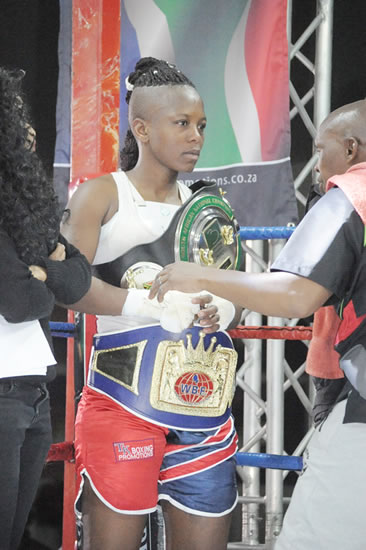 The province, in partnership with Skylon Promotions, recently hosted the Freezing Point Boxing Tournament in Welkom.
The province, in partnership with Skylon Promotions, recently hosted the Freezing Point Boxing Tournament in Welkom.
The tournament sought to give local boxers the opportunity to compete at a professional level, to strategically position boxing as a sport that can be enjoyed by the community, and to foster social cohesion.
The main bout, the SA Junior Featherweight title fight, saw Matshidiso ‘The Wasp’ Mokebisi successfully defend her title against Melissa ‘Honey Bee’ Miller.
The main supporting bout was between Jappie Mafatle and Gift Pilane, for the fighting for the featherweight title. Pilane won after just one round.
The MEC for Sports, Arts, Culture and Recreation, Mathabo Leeto welcomed the re-introduction of boxing to the province, adding: “This tournament will assist us in sustaining the boxing momentum.
“It is also important to mention that the department has made strides in promoting boxing in the province through the Macufe Boxing Tournament we host annually. The rich history and heritage that boxing has in our country must be preserved and promoted.”